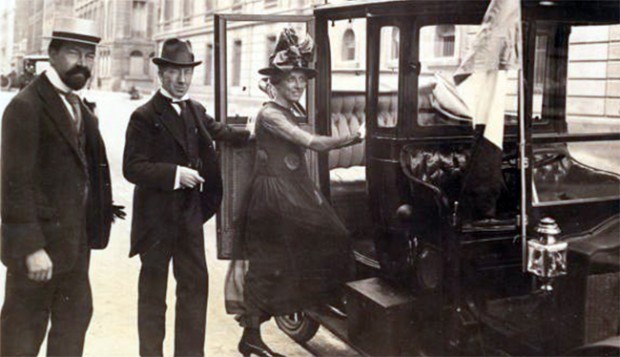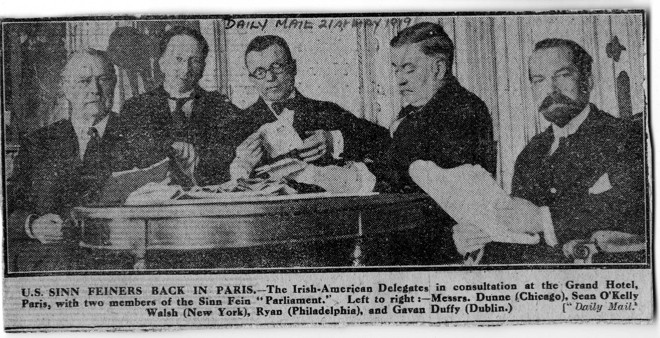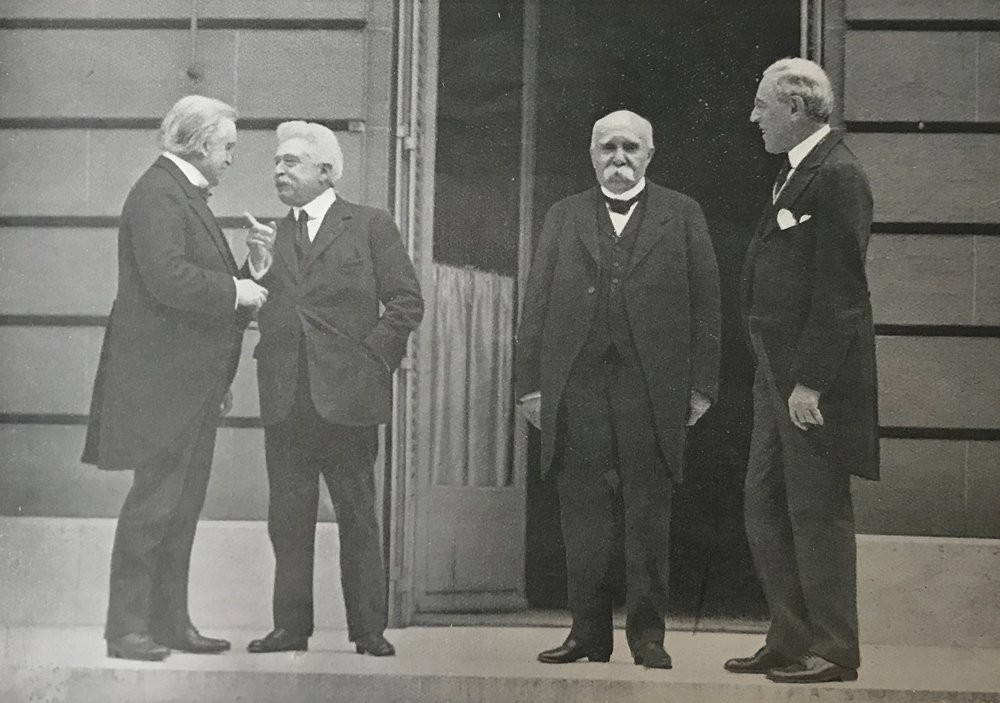25 May 2019
Paris Peace Conference
Remembering the Past - 100 years ago

• Charles Gavan Duffy, Seán T. O'Kelly and Margaret Gavan Duffy on their way to a meeting with Georges Clemenceau, the prime minister of France, Paris, May 1919
DURING THE EARLY MONTHS of 1919, following the ending of the 1914-18 European war and the establishment of Dáil Éireann in January, Irish representatives in France attempted to secure a hearing for Ireland at the Paris Peace Conference,
The first duty of the Dáil was to secure a hearing for Ireland at the Peace Conference and at its inaugural meeting on January 21st 1919, the day after the conference opened, three delegates, Eamon de Valera, Arthur Griffith and Count George Noble Plunkett, were appointed to represent Ireland in Paris. At a private meeting held the following day, the government accredited Sean T. O’Kelly to Paris as Envoy of the Government of the Irish Republic to try to secure the admission of the delegates appointed by the Dáil.
‘O’Kelly left Dublin on February 4th and on arrival in Paris took a room in the Grand Hotel on the Boulevard des Capucines where he opened an office.
He immediately tried to make contact with the American president, Woodrow Wilson, who was in Paris but Wilson failed to reply before going back to America. While O’Kelly continued his efforts in Paris, in the US Wilson was subjected to intensive pressure by the Irish lobby to get Ireland admitted to the Peace Conference.
A third Irish Race Convention held in Philadelphia on February 22nd and 23rd, appointed three members of the Friends of Irish Freedom (FOIF), Frank P. Walsh, Edward F. Dunne and M. J. Ryan, to go to Paris to reinforce the work of the Irish envoy.
On March 4th the US House of Representatives by 261 votes to 41 passed a resolution urging the Peace Conference to consider Ireland’s claim to self-determination favourably. On the same day President Wilson, who was about to sail to Europe, met 8 delegation from the Irish Race Convention, but his attitude towards Ireland’s case remained non-committal.
PERSISTENCE
Meanwhile in Paris the persistence of O’Kelly in presenting the Irish case was beginning to have some effect on the world’s press and international opinion generally.
On February 22nd he wrote to Georges Clemenceau, President of the Peace conference, and to every delegate of the conference in Paris. He brought to their notice the claim of the government of the Irish Republic for International recognition and requested the Conference to receive its delegates. O’Kelly’s first letter to Clemenceau produced no result nor did his letter of March 31st.

WIDESPREAD INTEREST
In May his work was reinforced by the arrival of the delegates from the Irish Race Convention, who had attracted widespread interest and sympathy for the Irish cause following their fact-finding mission to Ireland. However, while much international publicity resulted from all their activities in Ireland and in France, the Irish-American delegates had no more success than O’Kelly had in securing an official hearing for Ireland.
On May 17th 1919 the Dáil delegates, de Valera, Griffith and Plunkett, wrote to Clemenceau repudiating England’s claim to speak for Ireland, and a week later the official statement ‘Ireland’s Case for Independence’ was sent by the Republican government to the Peace Conference.
On June 11th President Wilson met the Irish-American delegates in Paris and informed Walsh that the Committee of Four ('The Big Four'), France, Italy, England and USA, had agreed that no small nation should appear before it without the unanimous consent of the whole committee.
Wilson had not only accepted England’s veto but was permitting Lloyd George to counter the demands of his own electorate for a hearing of Ireland’s case. With this interview the hope of a hearing at the Peace Conference for the Irish case came to a practical end, though O’Kelly and his staff continued their efforts.
‘Ireland’s Case for Independence’ was formally sent to the Paris Peace Conference on May 26th 1919, 100 years ago this week.

• Paris Peace Conference - 'The Big Four': British Prime Minister David Lloyd George, Italian Prime Minister Vittorio Orlando, French Prime Minister Georges Clemenceau and US President Woodrow Wilson
Follow us on Facebook
An Phoblacht on Twitter
Uncomfortable Conversations

An initiative for dialogue
for reconciliation
— — — — — — —
Contributions from key figures in the churches, academia and wider civic society as well as senior republican figures




